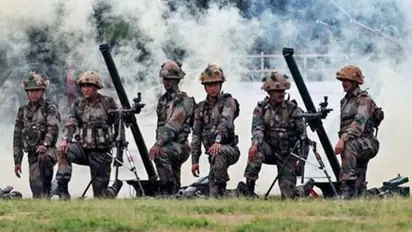
In a display of might and brute power, the Indian Army destroyed three terror camps in Pakistan. Around 10 Pakistani soldiers shielding these terror camps too were killed in retaliatory action by the Indian Army opposite to the Tangdhar and Keran sectors in Jammu and Kashmir.
The Indian Army carried out heavy artillery strikes and destroyed terror camps located at Athmuqam, Kundal Shahi and Jura on Sunday. This is a major attack after the Balakot strike by the Indian Air Force, which targeted a Jaish-e-Mohammad facility on February 26, 2019.
India has been warning Pakistan about the increase in infiltration attempts. However, Pakistan has resorted to unprovoked firing in a bid to provide cover fire to the terrorists it wants to help infiltrate into India.
The much-needed free hand:
The manner in which the Indian Army has been operating in the border is a clear indicator that it has been given a free hand and this government has decided to adopt a no-nonsense policy when it comes to fighting terror.
Air Marshal (retd), BK Pandey tells MyNation these actions by our armed forces was a long overdue step. Obviously, now the government has removed all restrictions on the Indian Army as it had done at the time of the Balakot strike.
The army has clearly been given a free hand and they will use artillery and hit what is in range. BK Pandey says that this would need to be a continuous action as all the terror camps that have been hit can be re-organised by Pakistan. They will continue to set up more camps and we need to keep hitting them.
Also read: Why does Kerala have an exclusive department for schedule caste converts to Christianity?
Pandey also points out that during the Congress regime the armed forces were not given a free hand. The army was not allowed to take action like it has been allowed now. They were restrained.
The importance of a free hand:
For the army to have a free hand, it is the political leadership which has to make up its mind. In such action, there is always the fear of escalation and generally this is not the preferred option.
Pakistan has nuclear weapons and have warned that they could fire it when in distress. However nuclear weapons are to avoid wars and not to fight them. Through this Pakistan has so far managed to avoid entry by the Indian armed forces into their territory.
Also read: Highest number of recruits: Here’s how Tamil Nadu became a playground for ISIS, radical Islam
BK Pandey says that this government under Narendra Modi thinks differently. Artillery fire was never resorted to before. The surgical strikes post Uri and the Balakot hit after the Pulwama attack indicate that our armed forces are no longer restrained. While we would continue to hit targets in Pakistan, we may still avoid war. Pakistan is anyway on a path of self-destruction.
Certainly, the armed forces want a free hand. It is rather silly, if you tie their hands behind their backs. If not given a free hand, they will feel totally let down. Moreover, giving our armed forces a free hand will lift their morale. Let us face it, the armed forces are meant to fight and if you restrain them, they will be completely distressed.
The Congress government never acted after the 26/11 attack in Mumbai. In 1962, the Nehru-Menon combination was a total disaster for the armed forces. In recent times, the forces have been given a free hand and they will get us the results. Pandey says that in the recent past this is the first time that the armed forces have been given a free hand.
The importance of freedom:
It is not just the army, but even other agencies that have been fighting terror were deprived of a free hand in the past. Take for instance the rise of radicalisation down South. Several groups, big and fringe had a free run.
Governments in South were latching on to Muslim support and this had led to the steep rise in radicalisation. Today, the situation is different. Take for instance the National Investigation Agency, which has been kept busy in South India.
The Agency, with no interference has been probing a host of cases relating to radicalisation, terror and the rise of the Islamic State. Even in places like Bhatkal, Karnataka which gave birth to the top rung of the Indian Mujahideen, there was an extreme amount of hesitation to act.
The Centre has been very clear about its policy on terror. It wants none of it and has hence given the agencies and the armed forces to go all out and clean up the mess. Agencies such as the NIA are today probing cases, which one would have never expected they would have several years back.
Another crucial case that the NIA is probing today is with regard to the terror funding in Kashmir. It has netted almost all top separatists and squeezed them of their funding. Security experts say that this government does not believe in the Track-2 diplomacy as it had failed in the past. It had identified the main problem to be money and radicalisation and is going after it, experts also point out.
Several army and police officials say that in order to investigate a case thoroughly and bring it to the logical conclusion, a free hand is what matters. No officer can investigate a case with a political class interfering in a bid to appease and also with the fear of being tripped over.